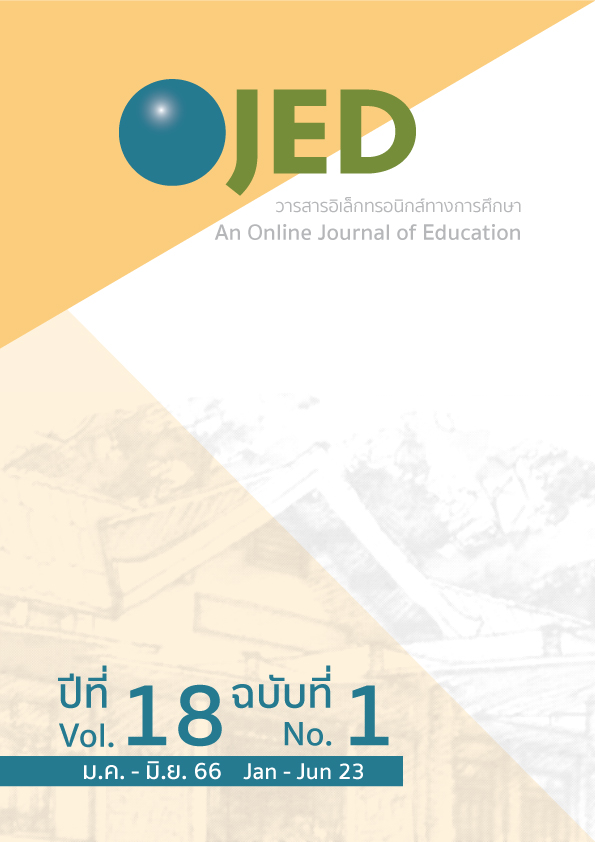Physical Education Learning Management Using SHAPE’s OLPE and Peer-to-Peer Learning Concept to Hockey Skills of Secondary School Students
DOI:
https://doi.org/10.14456/ojed.2023.4Keywords:
physical education learning management, shape’s OLPE, peer-to-peer learning concepts, hockey skillAbstract
This research aimed to study Physical education learning management using SHAPE’S OLPE and PEER-TO-PEER learning concept to Hockey skills of secondary school students. Methods: The subjects were 60 tenth grade students, divided into 15 students for the experimental group who were assigned to study under the physical education learning management system using SHAPE's OLPE and peer-to-peer learning concept, and 15 students in the control group who were assigned to study with the conventional teaching method. The research instruments were composed of eight physical education lesson plans using SHAPE's OLPE and the peer-to-peer learning concept with IOC 0.92, and the data collection instruments included a hockey skill test with IOC 1.00. The data were analyzed by mean, standard deviation, and t-test. The research findings were as follows: The mean scores of the practicing the right skills in hockey of the experimental group students after learning were significantly higher than before learning at .05 level.,
and the mean scores of the practicing the right skills in hockey of the experimental group students after learning were significantly higher than the control group at .05 level Physical education learning management using SHAPE’S OLPE and PEER-TO-PEER learning concept to Hockey skills of secondary school students were higher than Physical education learning management with the conventional teaching method.
References
ภาษาไทย
จุฬาลักษณ์ สงฆ์สระน้อย, นฤพนธ์ วงศ์จตุรภัทร, สันติพงษ์ ปลั่งสุวรรณ, และ สุรีพร อนุศาสนนันท์. (2563). ผลของการสอน
แบบเพื่อนช่วยเพื่อนที่มีต่อความแม่นยำในการเล่นลูกสองมือล่างในกีฬาวอลเลย์บอล. วารสารสุขศึกษา พลศึกษา
และสันทนาการ, 46(2), 197-208. https://so03.tci-thaijo.org/index.php/tahper/article/view/246913/ 166773
ชนานนท์ เชื้อนิลพิพัฒน์ม, อสมา มาตยาบุญ และธัญธัช วิภัติภูมิประเทศ. (2559). การปรับพฤติกรรมของนักเรียนที่ไม่กล้า
ว่ายน้ำโดยการเรียนรู้แบบเพื่อนช่วยเพื่อน. วารสารบัณฑิตศึกษา, 6(2), 226-239.https://grad.dpu.ac.th/
upload/content/files/%E0%B8%9B%E0%B8%B5%E0%B8%97%E0%B8%B5%E0%B9%88%206%20%E0%B8%89%E0%B8%9A%E0%B8%B1%E0%B8%9A%E0%B8%97%E0%B8%B5%E0%B9%88%202/%E0%B8%A7%E0%B8%B2%E0%B8%A3%E0%B8%AA%E0%B8%B2%E0%B8%A3%E0%B8%9A%E0%B8%B1%E0%B8%93%E0%B8%91%E0%B8%B4%E0%B8%95%E0%B8%A8%E0%B8%B6%E0%B8%81%E0%B8%A9%E0%B8%B218.pdf
ไทยรัฐออนไลน์. (2564, 27 เมษายน). กทม.เตรียมรับเปิดเทอม รับโควิด-19 จัด 4 รูปแบบเรียนการสอน. ไทยรัฐออนไลน์. https://www.thairath.co.th/news/local/bangkok/2078310
วีรพรรณ จันทร์ขาว, นฤพนธ์ วงศ์จตุรภัทร, สันติพงษ์ ปลั่งสุวรรณ และ เสกสรรค์ ทองคำบรรจง. (2563). ประสิทธิผลของการสอนแบบเพื่อนช่วยเพื่อนที่มีต่อความสามารถในการว่ายน้ำ. วารสารสุขศึกษา พลศึกษา และสันทนาการ, 46(1), 174-184. https://so03.tci-thaijo.org/index.php/tahper/article/download/238966/168282/882814
ศุภวรรณ วงศ์สร้างทรัพย์, ธีรนันท์ ตันพานิชย์, ฐิติกมลสิริ ลาโพธิ์, วิชนนท์ พูลศรี, และ ธนวัฒน์ ชลานนท์ (2564). การพัฒนาการเรียนการสอนโดยใช้ Google Classroom ในรายวิชากิจกรรมพลศึกษา สำหรับนิสิตมหาวิทยาลัย เกษตรศาสตร์ วิทยาเขตกำแพงแสน. วารสารสุขศึกษา พลศึกษา และสันทนาการ, 47(2), 166-176. https://so03. tci-thaijo.org/index.php/tahper/article/view/251422/169201
สำนักวิชาการและมาตรฐานการศึกษา กระทรวงศึกษาธิการ. (2551). ตัวชี้วัดและสาระการเรียนรู้แกนกลาง กลุ่มสาระการเรียนรู้สุขศึกษาและพลศึกษาตามหลักสูตรแกนกลางการศึกษาขั้นพื้นฐาน พุทธศักราช 2551. สำนักวิชาการและมาตรฐานการศึกษา. http://academic.obec.go.th/images/document/1559639643_d_1.pdf
สุพรรณี ยิ้มนวลล, บุญเลิศ อุทยานิก และสุวิมล ตั้งสัจพจน์. (2556). การสร้างแบบทดสอบทักษะกีฬาฮอกกี้ สำหรับนิสิตมหาวิทยาลัยเกษตรศาสตร์. วารสารคณะพลศึกษา, 16(1), 64-74. https://ejournals.swu.ac.th/index.php/ pe/ article/view/3584
ภาษาอังกฤษ
Collin A. W., Emily D’A., Urtel M., McMullen J., Culp B., Egan L.oiacono C. A., and Killian C.. (2021). Physical education in the COVID era: Considerations for online program delivery using the comprehensive school Physical activity program framework. Journal of Teaching in Physical Education, 40(2), 327-336. https://doi.org/10.1123/jtpe.2020-0182
David N. Daum. & Amelia M. Woods. (2015). Physical education teacher educator’s perceptions toward and understanding of K-12 online Physical education. Journal of Teaching in Physical Education, 34(4), 716-724. https://doi.org/10.1123/jtpe.2014-0146
Hyu-Chung Jeong. & Wi-Yong So. (2020). Difficulties of online Physical education classes in middle and high school and an efficient operation plan to address them. International Journal of Environ mental Research and Public Health. 17(19), 1-12. https://doi.org/10.3390/ijerph17197279
Marie Crosby. (2018). Discovering the best practices for design and development of high school online Physical education: A phenomenological study. [Doctoral dissertation]. Brandman University. https://digitalcommons.umassglobal.edu/cgi/viewcontent.cgi?article=1158&context=edd_dissertations
SHAPE America (2018). Guidelines for K-12 online Physical education [Guidance document]. Reston, VA: Author. https://www.shapeamerica.org/uploads/pdfs/2020/guidelines/Online-PE-Guidance-Document.pdf
Tyler Goad. & Emily Jones. (2017). Training online Physical educators: A phenomenological case study. Hindawi Education Research International. 17(1), 1-12. https://doi.org/10.1155/2017/3757489
Downloads
Published
How to Cite
Issue
Section
License
Copyright (c) 2023 An Online Journal of Education

This work is licensed under a Creative Commons Attribution-NonCommercial-NoDerivatives 4.0 International License.




